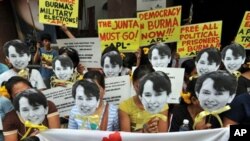Australia and Thailand have called for Burma to raise its human rights record, including the release of all political prisoners, before taking up the chair of the 10-member Association of South East Asian Nations in 2014.
Earlier this month, Laos was reported to have agreed to “swap” with Burma the chairmanship of ASEAN in 2014. Laos will chair in 2012.
The call came during weekend talks between Australian Foreign Minister Kevin Rudd and his Thai counterpart Kasit Piromya in the Thai capital, Bangkok.
Burma had foregone its right to chair ASEAN in 2005 amid international pressure over its human rights record. Burma now points to political reforms since then, including general elections last year and the formation of a new parliament together with the release of opposition leader, Aung San Suu Kyi, from house arrest last year.
But human rights groups argue the parliament is largely controlled by the military and military backed parties, while more than 2,000 political prisoners remain in jails throughout the country and attacks on ethnic communities continue.
The move by Burma to host ASEAN in 2014 is opening divisions within the organization.
Australia’s Rudd says Burma needs to make more progress before considering the ASEAN chairmanship.
“Our view as Australia is that we would want to see continued and sustained improvements in human rights and democracy in Burma. We in the past have welcomed the release of Aung San Suu Kyi, we have deep concerns about the continued detention of some 2,000 political prisoners.”
Rudd also pointed to issues such as the 110,000 Burmese living in refugee camps in western Thailand with ‘thousands’ more internally displaced in Burma due to fighting between ethnic groups and Burma’s army.
Indonesia Foreign Minister Marty Natelagawa, the current chairman of ASEAN, is due to visit Burma to assess its readiness to host the ASEAN meeting in 2014.
Thai Foreign Minister Kasit says an assessment has to include progress by Burma, also known as Myanmar, since the elections and Burma’s obligation under the ASEAN charter which includes recognition of human rights. Kasit says there remain outstanding issues.
“Especially the release of all the remaining political prisoners, the general overall freedom or liberalization of the whole political process as well as the long awaited dialogue between Daw Aung San Suu Kyi on behalf of the opposition with the newly installed government of Myanmar as part of the whole national reconciliation process and national building.”
Human rights groups welcomed the calls by Australia and Thailand for political reforms in Burma. Debbie Stothard is spokeswoman for the rights group Alternative ASEAN Network.
“Burma should not be allowed to chair ASEAN until it has engaged in genuine reform and that means release of all political prisoners and a cessation of war against all ethnic nationality communities.”
Stothard says if Burma took up the chair of ASEAN in 2014 without further reforms, key dialogue partner countries, that include Australia, Canada, the European Union and Japan as well as the United States, may boycott the meetings.
Australia and Thailand Pressure Burma on Rights Record




